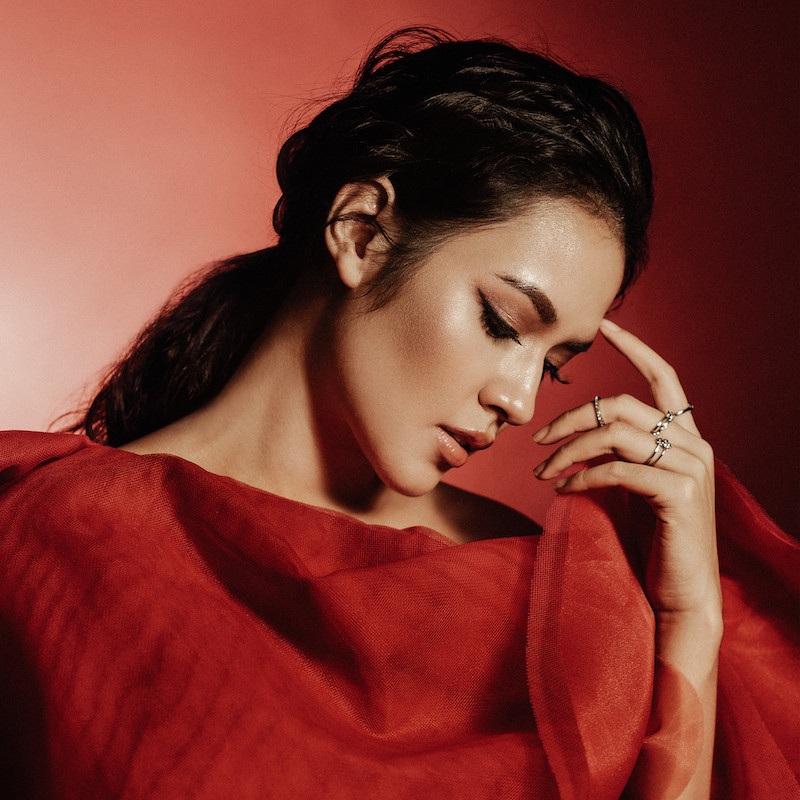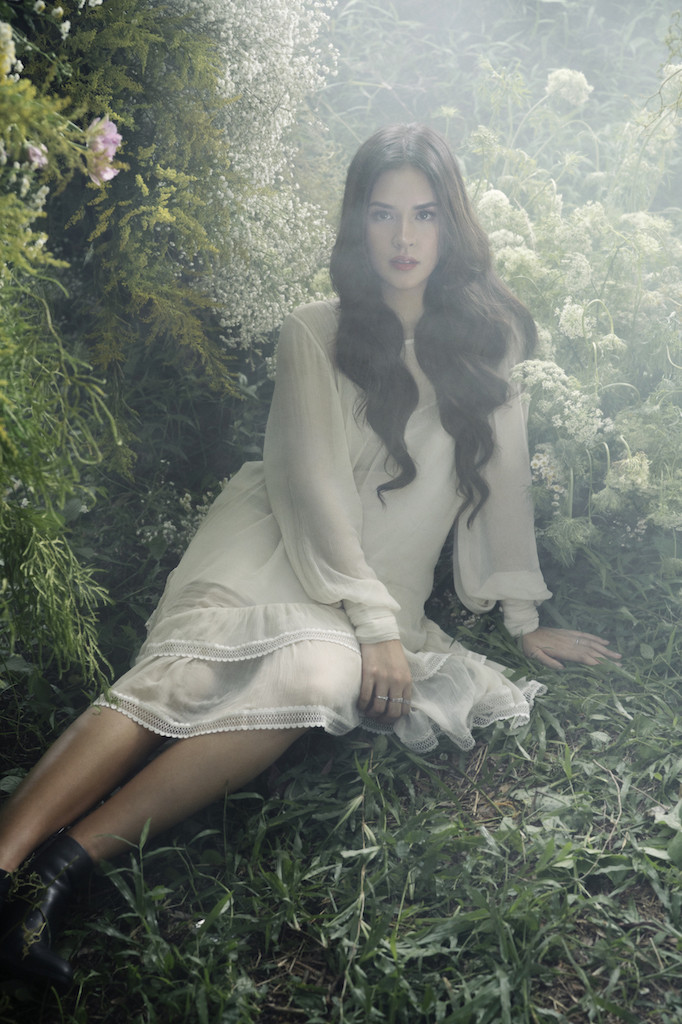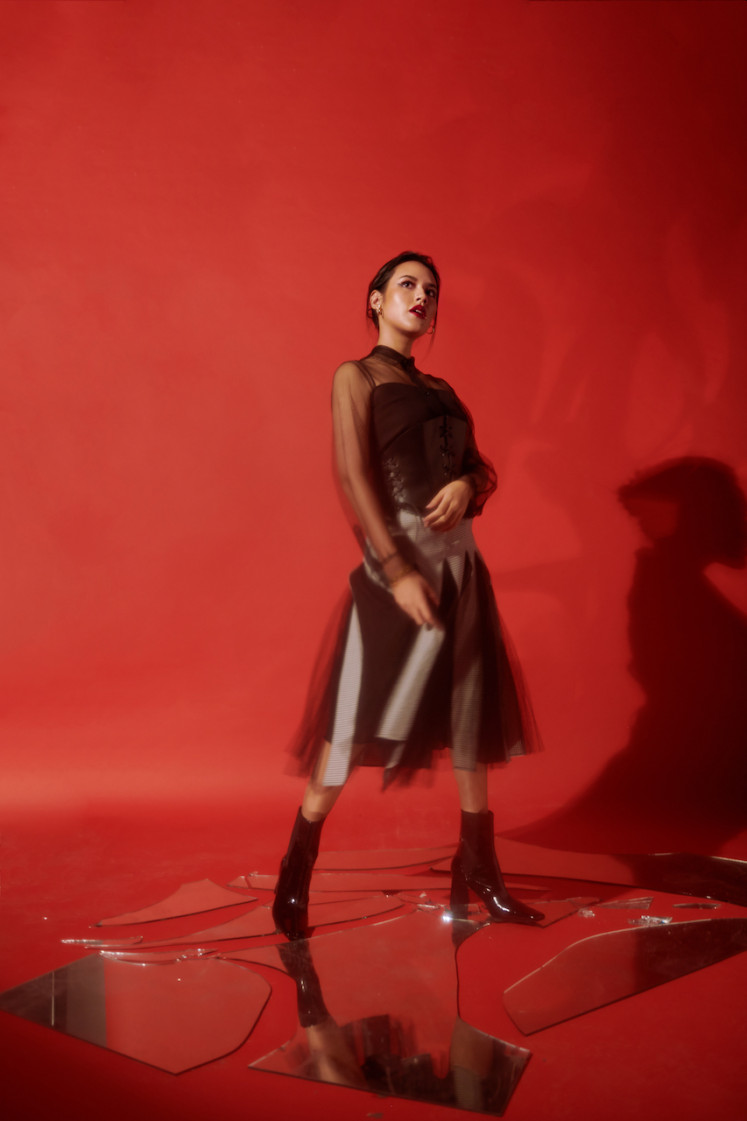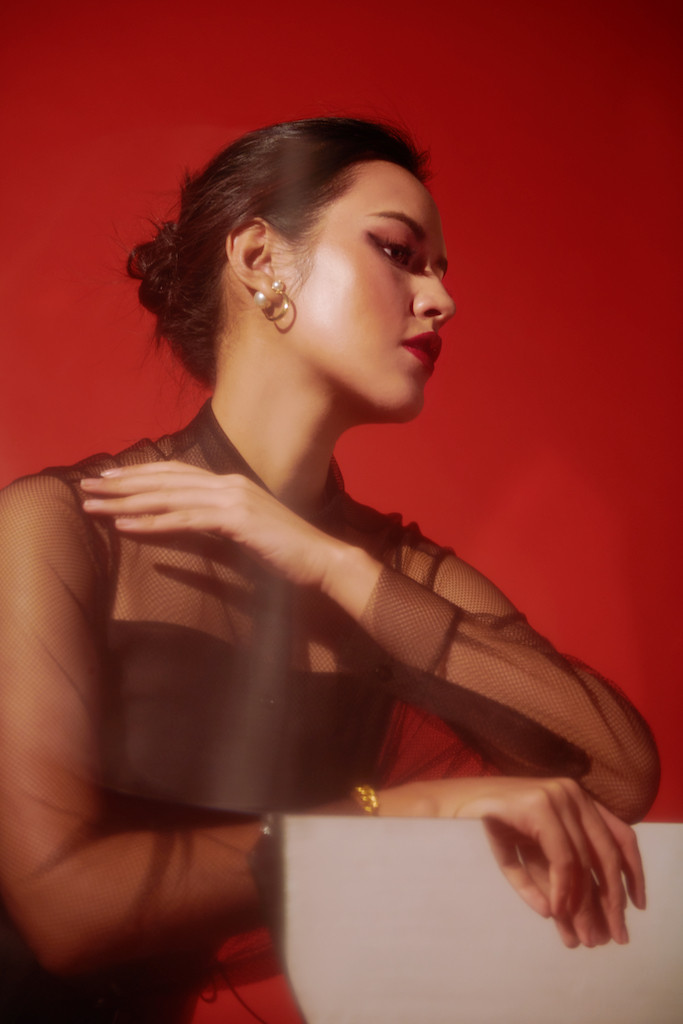Popular Reads
Top Results
Can't find what you're looking for?
View all search resultsPopular Reads
Top Results
Can't find what you're looking for?
View all search results20 questions with Raisa
Change text size
Gift Premium Articles
to Anyone
'20 questions' is a new Q&A column in which we talk to the country’s most intriguing individuals — from artists, celebrities, academics and activists to leaders, industry players and "regular" people with notable achievements.
The multi-hyphenate artist Raisa couldn't help but let out a sigh of relief when The Jakarta Post caught up with her on March 17 — the same day she dropped her fourth full-length album It's Personal (The Album) on digital platforms. After multiple delays and various hindrances due to the COVID-19 pandemic, the long-overdue expansion of her 2021 EP It's Personal has finally seen the light of day. Asked about what the release of The Album and the year 2022 mean to her, she said: "In a lot of ways, I feel like I'm back," declared the 31-year-old singer-songwriter.
"There were lots of headaches in the past," she continued, laughing. "[Because of the pandemic] I questioned what I should do and what kind of person I had become, both in my professional and personal lives. That said, music is something I know. It's a world I have become very familiar with over the last 10 years: dropping an album, performing live gigs and such."
Answering The Jakarta Post's 20 questions, Raisa weighed in on the journey of recording The Album, her proudest lyrics, her current perspective on fame and how she felt about the idea of taking a hiatus.
It's Personal EP is the first extended play to win an Anugerah Musik Indonesia [AMI] Award for Best of the Best Album. You were visibly taken aback when you went up to the podium to accept the award. Do you still remember what was going through your mind at that time?
I was amazed to the core! I noticed that "Bahasa Kalbu" [the 2020 remake of Titi DJ's song of the same title, featuring composer Andi Rianto] was a big hit and people responded to that song warmly, so I felt like my chance of winning a trophy was kind of 50-50. Still, I thought it was impossible for the EP to win [Best of the Best Album] because it was merely a half portion of an album! Also, it's difficult to measure what constitutes a successful record nowadays. If we look at the data and the views and such, the EP wasn't exactly a "viral" record.
It seems like that award gave a sort of validation: that an EP is as good as a full-length album. Do you feel there is still value to the LP concept in the current musical climate?
That's a tough question because we have already been programmed to have this short attention span. For instance, we wouldn't even want to spend our time watching someone's Instagram Story, even though it only lasts for 15 seconds. That's why, I think, having someone listen to 11 or 12 songs in consecutive order is a big ask. Having said that, at the end of the day, there's a reason why, as an artist, you decided to make an LP in the first place. There's an emotion and a thought behind why you make it the way you do and why you want to have your audience listen to it this particular way. I have had conversations with up-and-coming producers who have different views about it, though.
You’re working again with Marco Steffiano — one of your most frequent cowriters in your career. Does that long-lasting relationship sometimes result in musical ruts or formulas you consciously try to avoid?
That has happened a lot — he and I have been aware of this since day one. We were like, "Marco, we can't make this album sound like Handmade." When we were working on a ballad, for instance, we were like, "Marco, this shouldn't sound like "Usai Di Sini" [This Ends Here]." On top of that, Marco was often asked to make songs in the vein of "Kali Kedua" [The Second Time] for other artists. [laughs] But I think that's a problem faced by all artists who have managed a long career for themselves: how to reach out to a new audience without losing your essence.
It's Personal (The Album) examines love — a narrative theme that has persisted since your self-titled debut album back in 2011. From a lyrical standpoint, how did you ensure that you wouldn't end up repeating yourself?
I feel like now that I am a mother, I have a deeper and richer understanding of love — something that didn't exist when I was working on Handmade. During that Handmade era, I could write about heartbreak and stuff, but true love wasn't something I was capable of writing about at that time.
It's no secret that lots of female pop upstarts are influenced by your work — "The Raisa vibe", as some call it. Do you find that flattering or worrisome?
That's something that my team or the people closest to me are more aware of — they would come up to me and be like, "Hey, have you checked this out? Doesn't this sound similar to this or that?" But I'm not the type of person who pays attention to that sort of thing. I mean, maybe I used to notice it in the past, but now? Not really. Besides, the way I see it, there's no way I make music without listening to someone else's music. There's no way I have a discussion with my producers without mentioning and dissecting work by others. So when my work is being dissected by others, what's the difference?
What would you say constitutes that “Raisa vibe”? Or should we say, "Rai-Sound"?
I feel like there are moments when I notice that kind of vibe. I think it's a certain vocal lick that I do. In fact, lately I have been feeling like I'm doing those licks too often. That's why I need people to help me figure out how not to be repetitive. Also, I think the vibe comes from how I choose the notation and how I come up with improvisations. Sound-wise, songs like "Usai Di Sini", "Kali Kedua" and "Apalah (Arti Menunggu)" [What is [the Meaning of Waiting)] are very "Raisa". I would love to use that as a hashtag, though — #RaiSound [laughs]
You teased It's Personal (The Album) by first releasing "You Better Believe Me" last year: a hip-hop-influenced bop featuring nascent rapper Kara Chenoa. Who are some of your favorite hip-hop artists?
I haven't taken a deep dive into hip-hop music, but when I was looking for a collaborator for this song, I came to realize how lit the hip-hop music scene in Indonesia is — one of the examples of its artists being Kara Chenoa. That was really eye-opening for me. I was really glad working with Kara because I could feel the song being elevated [thanks to him].
You incorporated elements of gospel music in this album, in particular on the new additions "Cinta Sederhana" [Simple Love] and "Berdamai" [Make Peace]. Which gospel artists do you think influence you the most?
I'm not really familiar with gospel artists, but all of my producers — Marco, Jessi [Mates], Haris [Pranowo] — are gospel kids. I love how the gospel vibe can build and uplift, you know? And also, I was in a choir when I was younger, so I have always dreamed of having one and I was very happy when we got to add a choir for our showcase. If I could, I would love to add a choir for all of my songs [laughs].
Her new adventures: 'It's Personal (The Album)' showcases Raisa's experimentation with gospel and hip-hop elements. (Courtesy of Juni Records) (Courtesy of Juni Records/Courtesy of Juni Records)You worked with songwriters and musicians from overseas on this album, such as Sam Kim, Erskine Hawkins and Colin Rahim. From your experience, what is the difference between the creative process with these musicians and the creative process with your fellow Indonesians?
With musicians from overseas, they work very fast. Like, they could send me a guitar riff the next day! Also, they don't sugarcoat things. Like, "Do you like this or not? No? Alright, let's change it!" Very fast and very particular.
Which of your songs and lyrics do you feel most proud of?
There's a line in the song "Jangan Cepat Berlalu" [Don't Pass Too Soon] that says: [in Indonesian] "You teach me about true love, that I didn't understand before". I used to think that there was no such thing as unconditional love. When we give some, we usually want to take some as well. It's our human nature to expect reciprocation. But motherhood taught me that true love does exist, that this experience brought it from inside of me.
I feel so grateful for this song because it serves as a memento. Being a first-time mom isn't going to happen again, and I added some voice notes of my daughter's coos in the song. She's grown now and she doesn't coo like that anymore, so I will treasure that. And then, there's a line in the song "Cinta Sederhana" that says: [in Indonesian] "Allow me to study you". I think that's the most romantic lyric that I have ever written.
Now you are more than a decade into your career and your identity as a public figure. Was there ever a point when you wanted to calm things down and take it slow? Maybe be a little less-known when you go out?
I love my job too much [laughs]. If I ever think that way, that means I wouldn't be able to perform in front of a lot of people again, and I don't want that [laughs]. There was a time, during the early days of dating, that haters would pop off and make things difficult. But at the end of the day, I love singing and I love writing songs, and they outlast all the negative stuff.
You’re active on social media, especially Instagram, which isn’t always the friendliest place for celebrities. What has your general experience with it been like?
Sometimes I plan my social media stuff so that I don't get stressed out about it because if it were up to me, I wouldn't post anything interesting. I'm the type of person that, the more interesting where I am at the moment, the least likely I would post anything. Some people don't post anything for three weeks because they're on vacation — and I happen to be one of them.
Were there ever things you wanted to post but had reservations because of how well-known you are?
If I were in a fancy place, for instance, I would feel insecure because I would think, "Will people think this is how I live my life? Will they be pissed at me? Will they find me snooty?" Because I don't want people to feel bad about themselves whenever they check out my Instagram and stuff.
I remember before you became a soloist in the late 2000s, you were almost the vocalist of a band founded by Kevin Aprilio. Did you like being in a band?
In some ways, I'm still kind of in a band because my band is always with me on my travels. I sometimes miss it, though, whenever I do promos by myself. For instance, I did promos for a duet with Isyana [Sarasvati] and Afgan—it was really fun doing the promos together. I imagine it would be fun doing promos as a band. Still, at that time, it wasn't a difficult choice because the band's music and mine weren't a match. If they were and the options had been either being a soloist or being in a band, I don't think I would have been able to choose. Maybe I would have chosen the band.
Do you think if that band had remained, you would have still eventually gone solo?
I don't know! [laughs] There are lots of elements in that question that are making me overthink right now [laughs]. Maybe yes, maybe no.
Her rich wisdom: Raisa notes how motherhood has helped her find a richer understanding about love which subsequently informed the lyrical narrative of 'It's Personal (The Album)'. (Courtesy of Juni Records) (Courtesy of Juni Records/Courtesy of Juni Records)I also remember when you launched your clothing line YAY! By Raisa in 2017. What are some of your most memorable “yes” and “never again” fashion moments?
Lots of fashion fails back in the day. I would perform in jeans and the client would be like, "Change your pants and don't ever wear jeans again!" And I was like, "Sorry, sorry!" Back then I had no idea that fashion stylists and make-up artists existed. Where would I find one anyway? There was no Instagram back then! As a newcomer, I wasn't exposed to that, so whenever I went for an interview with a magazine, I would show up with the clothes I was wearing for class [laughs]. I was like, "My God, how can I live like this?"
My fashion glory was probably during last year's AMI Awards. I was wearing this very simple, off-the-shoulder, long, white dress that was supposed to be for a photoshoot. It was designed by my friend Pamela Usanto.
You also run coffee shop franchise Titik Temu. When you attach your name to your brand, or other brands, how much weight does it put on your shoulders?
It has to be something that I know that I won't have to lie about when I promote it. You get it? It has to be something I truly love and would have for myself. When I launched [children's clothing line] Rise N Shine, I did so because I found children's clothes adorable and I was going through that phase, so why not?
Right now I'm developing a make-up brand because it's a big passion of mine. I love beauty and I have found the power in beauty and make-up. It's in development right now and it will also become one of my big reveals this year.
Are there products or things that you feel uncomfortable attaching your name to?
Well, if I wouldn't have it and I wouldn't recommend it to my friends, how could I ever sell it?
Ten years and four full-length albums later, have you ever considered taking a hiatus from the music industry? Or perhaps taking an aspiring artist under your mentorship?
Music is my outlet to channel my emotions. I am a pretty introverted person and it's difficult for me to express what I feel, so I pour everything into my music. That's why I need this. I need to sing. I need to write songs.
[As for mentoring] I'm a good listener, that's for sure. If you want my advice, I got it. But teaching? You have to show the result first — having someone incapable become capable. I don't know if I can do that [laughs].
Suppose there is a chance to expand one of your previous albums in the vein of It's Personal: Full Album, which one would you choose and why?
Handmade, for sure. Because that album was, at the time, very, very me. And I am so proud of all the songs in it. If I weren't the one writing those songs, I would probably be like, "Ugh, I wish I wrote those songs!" But since I was the one writing them, I would be like, "Huh? How did I do that?"
Last question, are there any of your songs you wish more people would listen to?
It's "Nyawa dan Harapan" (Soul and Hope). I don't know how, but I was shocked I had it in me to write that song. That and also, "Biarkanlah" [Let Go]. I love that song. Like, "Hmm, that's good!" [laughs]
Raisa's It's Personal (The Album) is available to stream.













